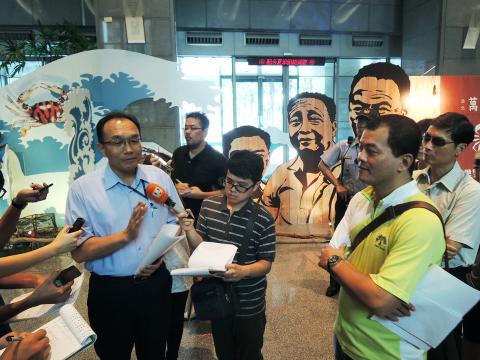The Taiwan Smokers’ Rights Association yesterday accused the New Taipei City Government of breaking the law and violating students’ rights with its request that junior and senior-high schools conduct tobacco tests on suspected smokers.
“It is not about ‘you have nothing to worry about if you don’t smoke,’ the problem is that the [city’s] Education Bureau and the school have no right to ask students to take a tobacco test,” association president Chen Chi-an (陳麒安) told reporters and bureau officials during the protest at New Taipei City Hall.
“It does not matter if the student tested positive or negative — such a test is simply unlawful,” he said.

Photo: Weng Yu-huang, Taipei Times
The bureau announced early this week that it has allocated 125 tobacco detectors to junior and senior-high schools across the city, and asked school administrators and teachers to conduct tobacco tests on students who are known to be smokers or suspected to be smokers, and place smokers on quit-smoking programs.
Chen said the law mandates that such tests can only be conducted if there is a warrant from the court or a prosecutor.
“We hereby urge students to refuse to take the test when asked by their school, and if the school threatens to penalize them for refusing, they can file a lawsuit against the school for breach of freedom,” he said.
Chen added that the group would provide legal counsel or assistance to students if needed.
Peng Yun-hua (彭允華), the bureau’s Campus Security Office director, defended the policy, saying it was entirely legal and well-intentioned.
“According to relevant laws, people under the age of 18 are prohibited from smoking. Moreover, it is a known fact that smoking is harmful to health; therefore, the policy is aimed at helping students quit smoking if they are already smokers,” Peng told reporters at a press conference.
“As to the legality issue, a warrant from the court or a prosecutor is only mandatory for conducting intrusive tests, but a tobacco test only requires the student to blow into the device, and so a warrant is not needed,” he said.
Asked if students might be penalized for refusing to take the test, Peng said that he hopes that “students will not refuse.”
He added that the bureau has instructed schools to gently persuade them and that penalties would only be used as a last resort.
Separately, the Humanistic Education Foundation also voiced its opposition to the tobacco tests, as well as a request from Minister of Education Wu Se-hwa (吳思華) to add drug tests to routine physical exams in school.
The foundation said in a statement that the ministry should not act as if it is the National Police Agency, and that it should not treat students like suspects.

SECURITY: As China is ‘reshaping’ Hong Kong’s population, Taiwan must raise the eligibility threshold for applications from Hong Kongers, Chiu Chui-cheng said When Hong Kong and Macau citizens apply for residency in Taiwan, it would be under a new category that includes a “national security observation period,” Mainland Affairs Council (MAC) Minister Chiu Chui-cheng (邱垂正) said yesterday. President William Lai (賴清德) on March 13 announced 17 strategies to counter China’s aggression toward Taiwan, including incorporating national security considerations into the review process for residency applications from Hong Kong and Macau citizens. The situation in Hong Kong is constantly changing, Chiu said to media yesterday on the sidelines of the Taipei Technology Run hosted by the Taipei Neihu Technology Park Development Association. With

A US Marine Corps regiment equipped with Naval Strike Missiles (NSM) is set to participate in the upcoming Balikatan 25 exercise in the Luzon Strait, marking the system’s first-ever deployment in the Philippines. US and Philippine officials have separately confirmed that the Navy Marine Expeditionary Ship Interdiction System (NMESIS) — the mobile launch platform for the Naval Strike Missile — would take part in the joint exercise. The missiles are being deployed to “a strategic first island chain chokepoint” in the waters between Taiwan proper and the Philippines, US-based Naval News reported. “The Luzon Strait and Bashi Channel represent a critical access

CARROT AND STICK: While unrelenting in its military threats, China attracted nearly 40,000 Taiwanese to over 400 business events last year Nearly 40,000 Taiwanese last year joined industry events in China, such as conferences and trade fairs, supported by the Chinese government, a study showed yesterday, as Beijing ramps up a charm offensive toward Taipei alongside military pressure. China has long taken a carrot-and-stick approach to Taiwan, threatening it with the prospect of military action while reaching out to those it believes are amenable to Beijing’s point of view. Taiwanese security officials are wary of what they see as Beijing’s influence campaigns to sway public opinion after Taipei and Beijing gradually resumed travel links halted by the COVID-19 pandemic, but the scale of

Pope Francis is be laid to rest on Saturday after lying in state for three days in St Peter’s Basilica, where the faithful are expected to flock to pay their respects to history’s first Latin American pontiff. The cardinals met yesterday in the Vatican’s synod hall to chart the next steps before a conclave begins to choose Francis’ successor, as condolences poured in from around the world. According to current norms, the conclave must begin between May 5 and 10. The cardinals set the funeral for Saturday at 10am in St Peter’s Square, to be celebrated by the dean of the College